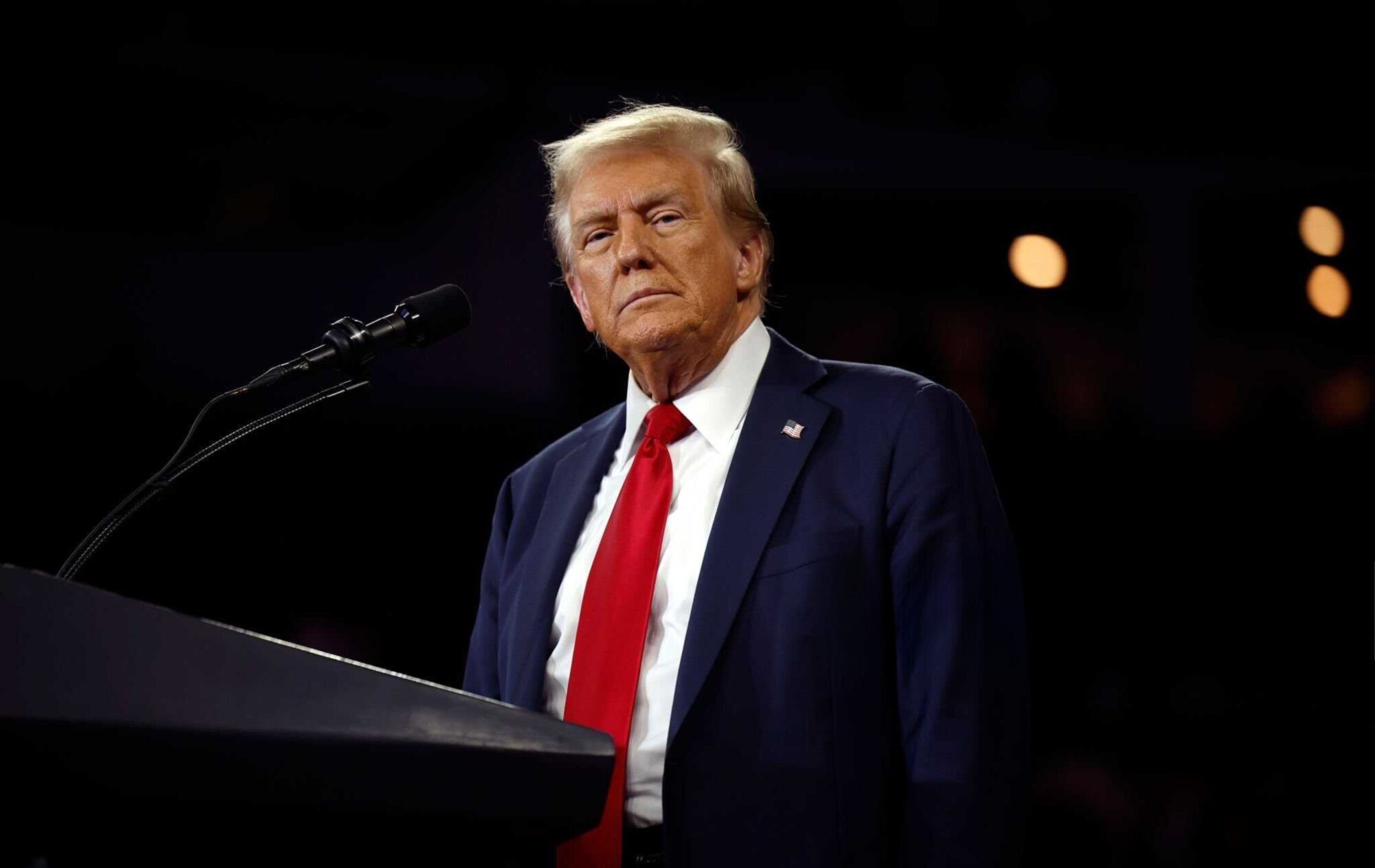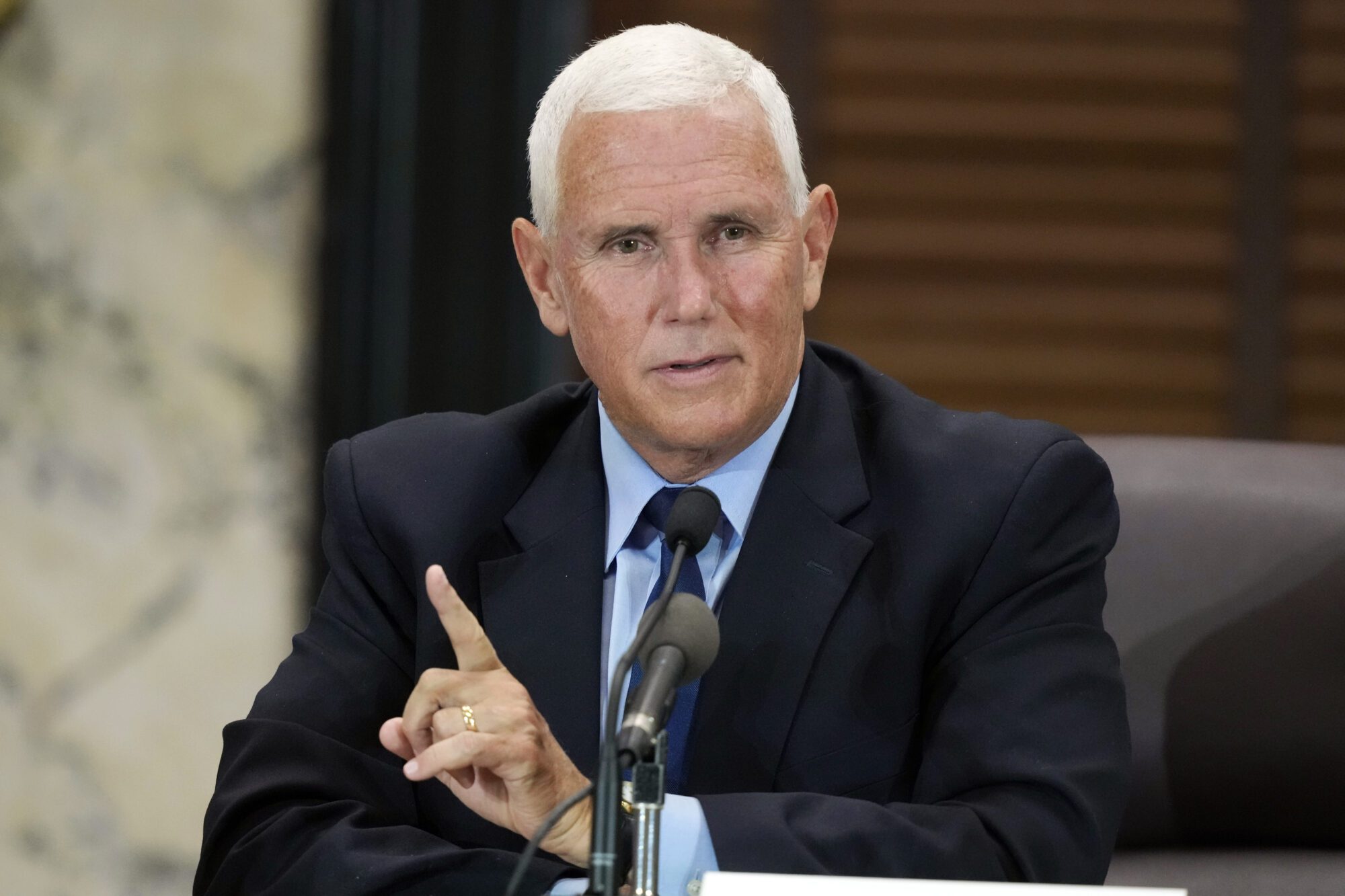
Republican presidential candidate and former Vice President Mike Pence speaks about his book, "So Help Me God," Saturday, Aug. 19, 2023, at the Mississippi Book Festival in Jackson, Miss. Pence was one of several dozen authors who participated in a variety of panels or sit-down interviews for festival attendees. (AP Photo/Rogelio V. Solis)
Mike Pence is careful in his critiques of Donald Trump, but it’s hard to wage a war for the soul of a political party if you are unwilling to fire shots.
On Saturday afternoon, just days before the first Republican Presidential Debate, former Vice President Mike Pence took the stage at the Mississippi Book Festival. Former Mississippi Governor Haley Barbour introduced Pence, and his interviewer, former Congressman Gregg Harper.
Barbour described Pence’s conservative credentials, his help for Mississippi in the wake of Hurricane Katrina, and his penchant for getting “toothpaste out of the tube,” a nod to his pragmatic-side abilility to get things done in Washington.
Harper called Pence a “friend and mentor.” He recalled how he had looked up to Pence while the two served in Congress together. For over an hour, the pair discussed the Vice President’s book, “So Help Me God.” A packed crowd, that included a long list of Republican leaders from days gone by, supplied Pence with multiple standing ovations.
Amid the accolades and raucous applause, it would be easy to forget that Pence is polling in the low single digits in the early stages of the 2024 Republican Presidential Primary, or that he is reviled by a solid portion of former President Donald Trump’s base as a “traitor.”
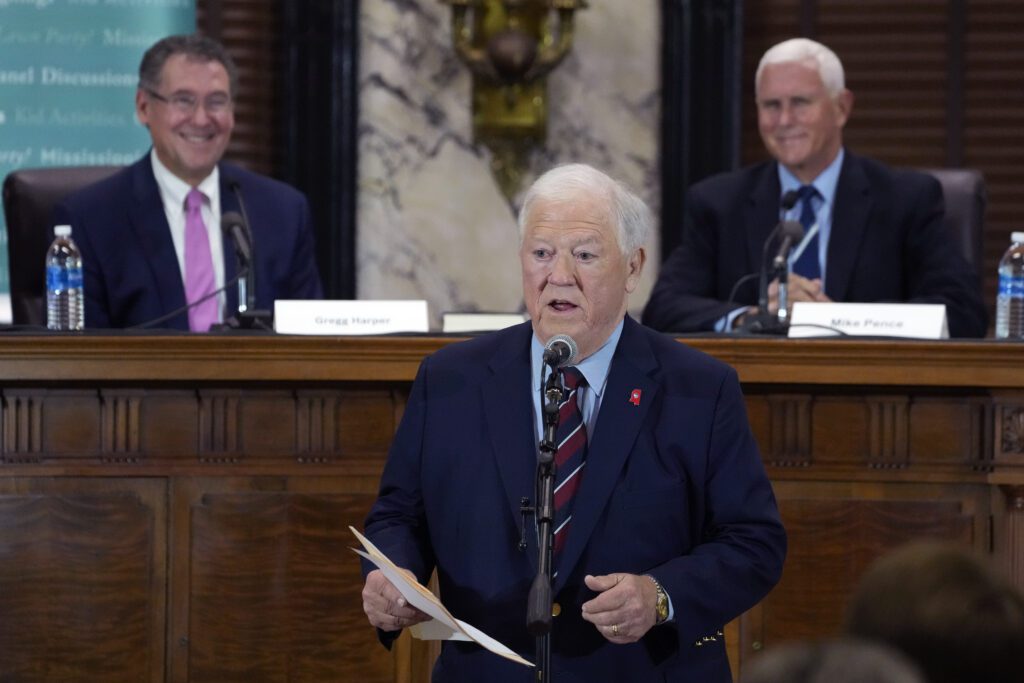
Saturday brought a Ronald Reagan-crowd to the Mississippi State Capitol to express support for a Ronald Reagan-style Republican. Pence identified Jack Kemp as a personal hero. Kemp, a former congressman, vice presidential candidate, and Reagan acolyte, was committed to low taxes and free markets. He is long forgotten in a modern Republican Party more animated by flash culture wars and brash personalities.
Pence’s brand would have made him a serious White House contender within a 1980s or 1990s style Republican Party. In 2023, the path appears much harder.
Pence regailed the friendly audience with stories about his faith, his family, his journey in American politics, and his experience in D.C. on September 11th. Most of the conversation, however, revolved around a different date–January 6th–the date now infamously associated with Capitol riots aimed at stopping the peaceful transfer of power following Joe Biden’s victory in the 2020 election for president.
Trump’s Shadow Looms Large
What was striking in his comments on Saturday, and in Pence’s recounting of the topic more generally, is not what he says about January 6th. He spends most of his energy explaining the courage of Capitol Police that day, and in reflecting on the importance of not fleeing the Capitol, but staying to finish the certification of the election.
“I had a deep conviction that I needed to stay at my post, and we did. My wife Karen was actually encouraged to go home, she had a separate vehicle with my daughter, and she basically said if you’re staying I’m staying. And my wife was at my side until four in the morning the next day when we finished our work of the Constitution of the United States,” Pence explained to another standing ovation.
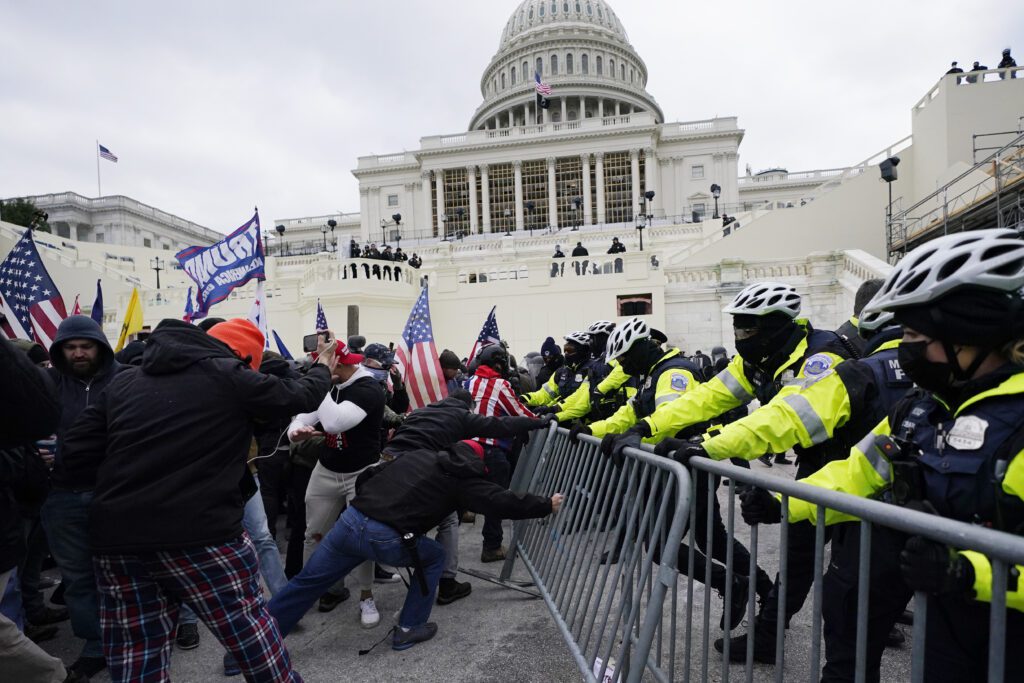
No, what is telling is the omission from the conversation.
Pence acknowledges a disagreement with President Trump over whether a vice president can constitutionally overturn the outcome of an election by not accepting duly qualified electors. Trump’s crack legal team had inexplicably argued he could. Pence rightfully disagreed.
But Pence was painfully careful on Saturday not to blame Trump for the January 6th riot, or to offer any real overt criticism of his former boss. Indeed, Pence gave Trump credit for saying the right things in the aftermath of the riots, noting that Trump told the rioters to go home and that he said they would be held accountable.
At separate points, Pence spoke of loyalty to the former President and a mostly “amicable” relationship. He expressed pride in the accomplishments of the “Trump-Pence” administration.
What became clear in listening was a very purposeful decision not to directly attack the former President. Instead of drawing stark contrast, Pence presents as a vanilla alternative to Trump. This decision occurs against a backdrop of riots that saw people build gallows outside of the U.S. Capitol and threaten to hang Pence.
Pence is not alone in the delicate dance around Trump. Prior to his interview at the Book Festival, a separate panel featuring Politico writer Jonathan Martin took place. Martin observed that privately many Republican leaders desperately want to be done with Trump. Those private sentiments do not, however, make it into the public sphere.
There is little courage to take Trump on among Republican politicians. For better or worse, he has become the sun of the Republican Party. No one wants to be Icarus, fly too close, and get their wings burned off. Republican hopefuls remember Jeb Bush, Marco Rubio, and Chris Christie in 2016, or Liz Chaney in 2022. They also see Ron DeSantis’ imploding campaign in 2023.
Instead, most candidates seem to be taking a “wait and see” approach–hoping that Trump fades amid a swirling sea of indictments and that they can somehow pick up his base. It’s unlikely.
Trump, to his credit, continues to figure out ways to maintain his spot at the center of the Republican universe. With each passing criminal charge, his star grows brighter among a base fully embracing the idea that he is being unfairly persecuted.
Trump’s decision to forego the first debate and instead do an interview with embattled cable news personality Tucker Carlson, will diminish both the reach and importance of the debate. The story will not be who is there or what is said, but who is not there.
Morning or Evening in America?
In 1984, Ronald Reagan won a landslide re-election over Walter Mondale. Reagan won an astonishing 49 states, losing only Mondale’s home state of Minnesota. At the center of the campaign was the idea that it was “morning in America.” The message was one of optimism and hope, a signal that our nation was early in its success story and bright days were ahead.
Fast forward to 2023, and the political rhetoric from both sides of the aisle is darker. The public square is dominated by people suggesting it is evening in America–that everything has gone awry, that the promise of our nation has dwindled, that our divisions are irreparable, and our only hope for secular salvation is a strong leader who whips the “other side” into submission.
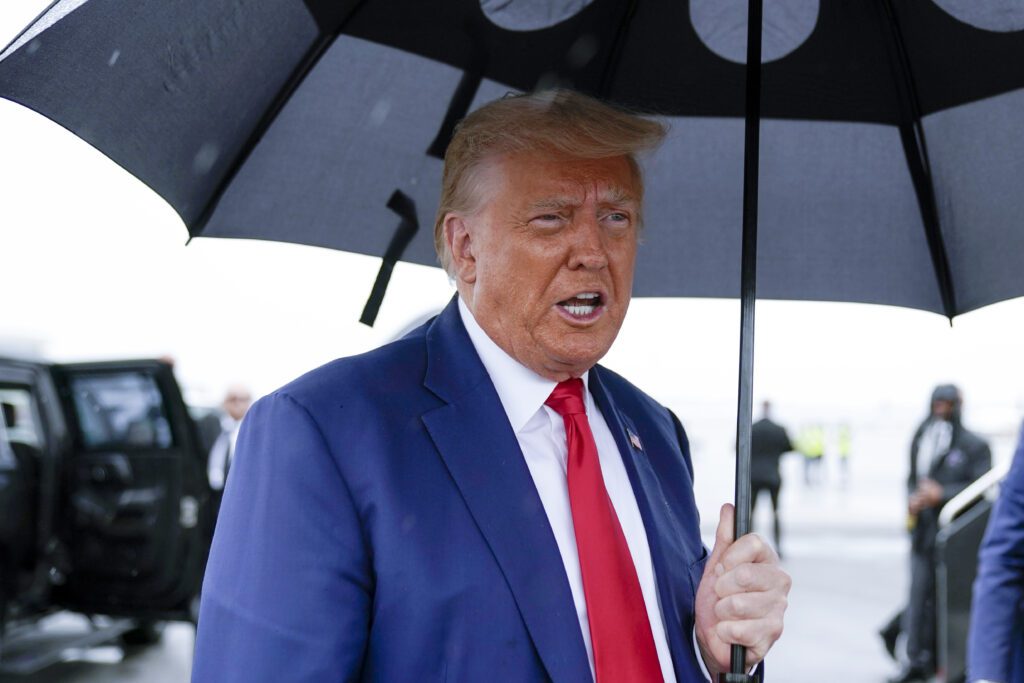
There is undoubtedly a conservative remnant of the Republican Party that sees Donald Trump as an “evening in America” kind of leader. They would like to see the evening end and morning return.
But Reagan is dead and the memory of his brand of conservatism is fading. He cannot be reanimated to fight for the future of conservatism. Modern candidates with new messages will have to do it for the remnant to see dawn break again.
The chances of victory may, at this point, seem slight. It is an uphill charge into a well-formed line for a candidate like Mike Pence to take on Donald Trump. But there is no chance of victory standing on the field of battle, playing footsie with your opposition in hope that they don’t train their cannons on you. People who threatened to hang you are not going to respect you more if you genuflect.
It’s hard to wage a war for the soul of a political party if you are unwilling to fire shots. There must be bannermen willing to charge with selfless courage if there is any hope of rallying more troops. And for Republicans to have any chance of winning a general election in 2024, the hill must be taken.






